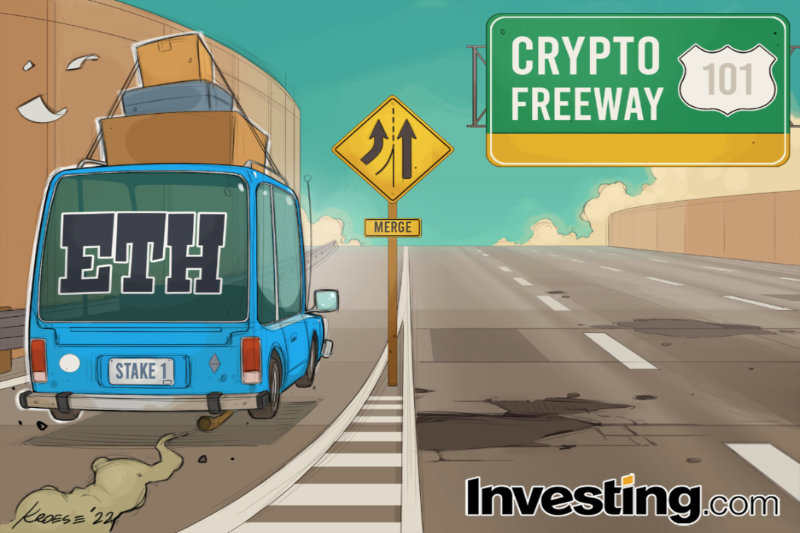By Geoffrey Smith
Investing.com -- The crypto community spent years waiting for the Ethereum network’s big transformational moment. But now that it’s nearly here, the transformation is looking very different from what was expected.
For that, the credit – or blame – lies squarely with the U.S. Treasury. Its decision two weeks ago to sanction Tornado Cash, a protocol on Ethereum that allows users to hide the origin and destination of funds, has jolted the community out of its technological navel-gazing and forced it to focus on what Ethereum – or any digital currency network – is actually for. Is it for the creation of a serious alternative to the established financial system, or is it just a way for the disaffected and hostile to enrich themselves beyond the reach of the law?
It wasn’t supposed to be this way. The Merge, as it’s known, was supposed to be a piece of software engineering that would slash the network’s energy needs, allowing it create tokens more quickly and cleanly and thus to execute transactions more quickly and cheaply. Vitalik Buterin, the creator of Ethereum, said earlier this month that the Merge should happen on or around Sept. 15.
At a stroke, it was argued by enthusiasts, the big obstacle to scaling up a crypto network to something looking more like Visa’s or Mastercard’s would be removed. The financial network of lending, depositing and trading that has already flourished on the Ethereum network - making its token, Ether, the second-most important crypto asset in the world after Bitcoin - would be turbocharged for growth.
The hype always had a whiff of utopianism about it, and boosters were already struggling to sustain the excitement after six years of delay. A Federal Reserve-induced downturn in crypto prices this year, which exposed the fragility and poor governance of many companies that styled themselves as the engine of the network’s growth, also dampened spirits: from a peak of $4,860 last November, Ethereum fell to a low of under $900 in June.
It has since recovered to around $1,640 at the time of writing, and might have rebounded further, without the Treasury’s intervention to close down Tornado Cash, which it called a “notorious virtual currency mixer” in the service of North Korea and organized criminals responsible for a series of crypto heists this year.
Why is this important? Because the Merge is designed to end the process of ‘mining’ new blocks with enormous amounts of computing power and give the job of approving transactions to the custodians of large amounts of blocks of Ether. This effectively centralizes the day-to-day development of the network in the hands of a few large holders of ‘staked’ Ether, known as ‘validators’ – a big change from the riotously decentralized and competitive mining process that dominates crypto today.
But the larger the custodian, the more likely it is to shy away from anything that would get it in trouble with the Treasury Department. And without permission from validators, transactions will be refused and the whole system can grind very quickly to a halt.
The chief executive of crypto exchange Coinbase (NASDAQ:COIN), which some see as the 800-pound gorilla among future validators, has already said via Twitter (NYSE:TWTR) that he would rather refuse business than touch anything that has Tornado in its (all-too transparent) blockchain.
That part of the Ethereum community that – for whatever reason – likes the anonymity provided by Tornado is now busy hollering “Censorship!” and threatening legal action. Tornado, they argue, is just computer code, and computer code has enjoyed strict freedom-of-speech protections under the U.S. Constitution to date. But that could be a hard argument to defend, given its obvious and repeated use by bad actors, including those financing rogue nuclear power.
The final result could be the splitting of the Ethereum blockchain into two through a so-called ‘hard fork’ – one chain transparent and clear of the taint of Tornado, and the other anonymous and vulnerable to Treasury sanctions. That would make it more likely that the dream of building a new financial system on the Ethereum blockchain remains just that – a dream.
However, it would have the salutary effect of forcing the community to resolve the crypto’s great internal contradiction: it can either be transparent and regulated, or anonymous and unconstrained. It can either grow into something that meets the legitimate and natural needs of the large mass of consumers, or it can stay at the margins and be a playground for scammers, organized criminals and computer whizzes.
It can't be both.
